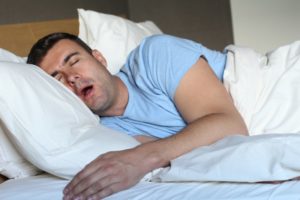
Sleep apnea is an irritating and dangerous condition that causes you to stop breathing for short periods of time while you’re sleeping. Not only does this disrupt your sleep cycle and keep you from getting the rest you need, but it can trigger mental health issues, hinder the immune system, and increase risk of serious health problems like heart disease and memory loss. While sleep apnea is best treated by your doctor or dentist, there are a few simple lifestyle changes you can make to lessen the severity of your symptoms. Read on as your Granby dentist shares six at-home sleep apnea remedies that can help you rest easier every night.
1.) Maintain a Healthy Weight
Obesity in the upper body narrows the nasal passages and can cause the airways to collapse as the muscles relax during sleep. Research shows that losing weight can eliminate the need for upper airway surgery or long-term CPAP therapy, and in some cases eliminate sleep apnea entirely.
2.) Try Yoga
Sleep apnea is associated with decreased levels of oxygen in the blood. Yoga emphasizes breathing techniques, which improves respiratory strength and encourages the flow of oxygen. Since sleep apnea is associated with decreased levels of oxygen in the blood, better respiration can help reduce the amount of sleep interruptions you may experience.
3.) Change Your Sleep Position
While altering your sleeping position may seem like a small change, a 2006 study found that more than half of adult sleep apnea cases are dependent on it. Researchers have found that sleep apnea symptoms can worsen when an adult sleeps on their back, and that many can improve simply by sleeping on their side instead.
4.) Use a Humidifier
Humidifiers can help alleviate a variety of irritating symptoms, including congestion and inflamed nasal passages caused by dry air. When placed near your bed, they can help open your airways and encourage clearer breathing as you sleep.
5.) Avoid Alcohol & Smoking
Both alcohol and smoking contribute to inflammation in the airways and worsening snoring. Additionally, alcohol relaxes the throat muscles, making them more likely to collapse and obstruct normal breathing during sleep. Alleviating your sleep apnea is only one of many health benefits you can enjoy by quitting smoking and cutting back on alcohol.
6.) Talk to Your Dentist About an Oral Appliance
Unlike a CPAP machine, oral appliances for sleep apnea are small dental devices that resemble a mouthguard. They reposition your jaw and tongue to comfortably help keep your airways open throughout the night. While there are plenty of over-the-counter oral appliances available, a custom-fit device from your dentist provides personalized treatment for better sleep quality.
While these home remedies for sleep apnea can help you manage your symptoms, they’re not a suitable substitute for visiting your doctor or dentist for professional treatment. However, these simple habits and lifestyle changes may be able to help you regain a good night’s sleep.
About the Practice
Salmon Brook Dental has been caring for the families of Granby, CT since 1987. In addition to their array of excellent dental services, they offer oral applications for sleep apnea. These custom-made devices are designed to fit perfectly in your mouth to provide a much more comfortable and convenient treatment than loud CPAP machines. If you’d like to learn more about treating sleep apnea, feel free to reach them with your questions via their website or at (860) 653-4551.
